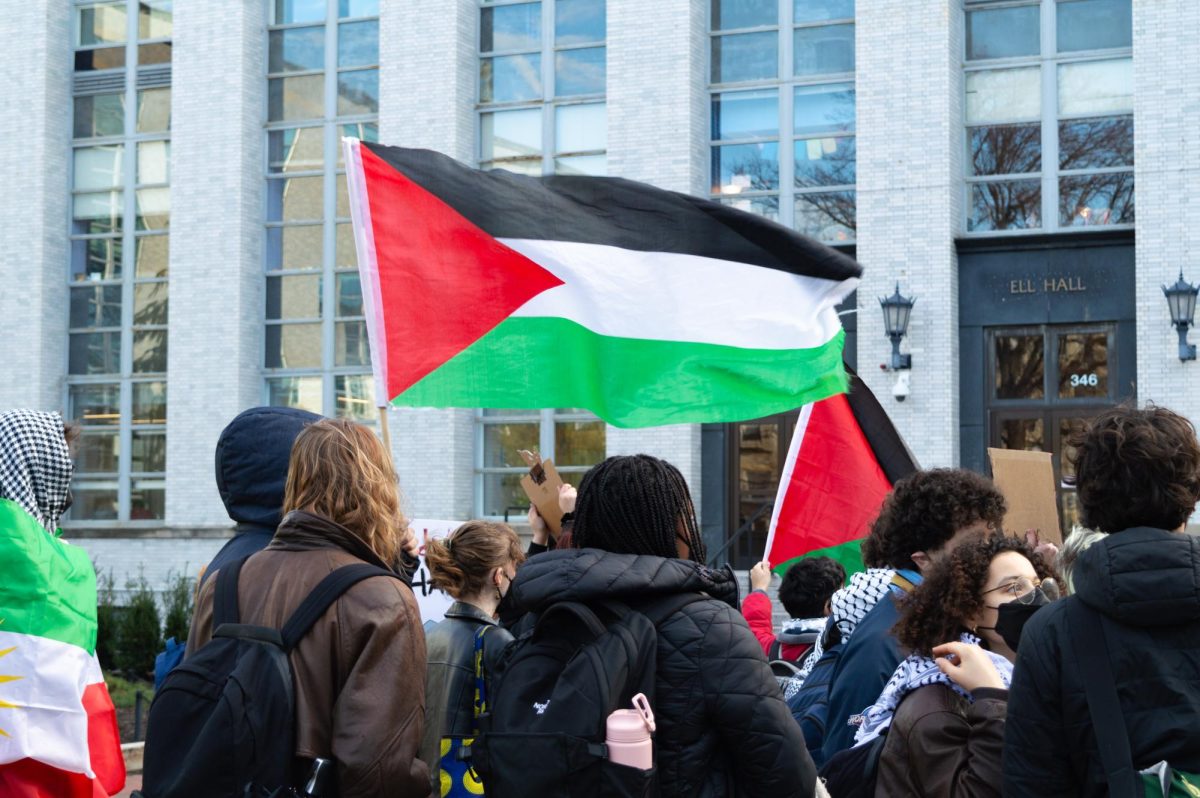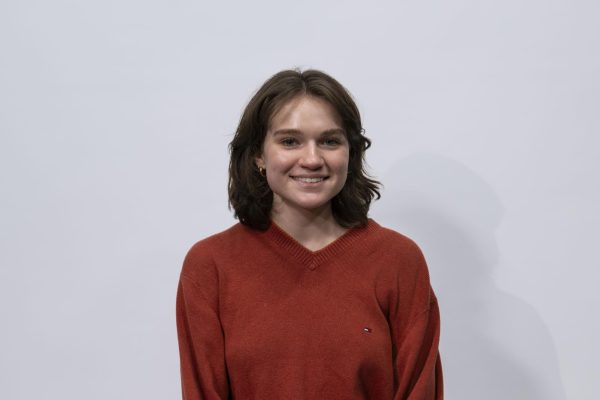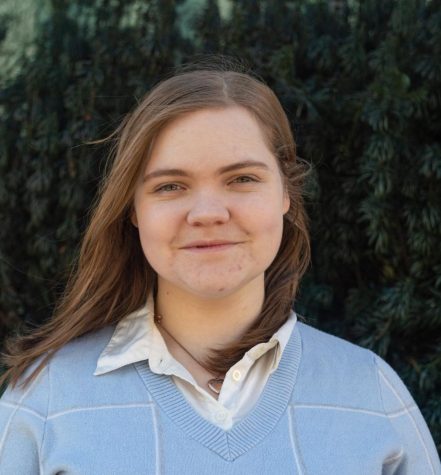In the weeks following Northeastern’s statement indicating it would not divest from companies doing business with the Israeli military, students responded to the decision with a wide range of emotions — some with anger and resolve, others with respect and gratitude.
Student organizations, including Divest Northeastern and Sunrise Northeastern, have been pushing for divestment from various military-industrial and fossil fuel-producing companies for years and responded with statements condemning the university and calling for continued action. Others said they respect the university’s stance and don’t believe divestment would be effective.
The university updated an FAQ article originally published Dec. 11 on the school-run media outlet Northeastern Global News Feb. 14, answering the questions, “Will Northeastern sever ties with corporations that do business with the Israeli military?” and “Will the university commit to divest its endowment holdings in these companies?” The school said it does not “impose a political test on employers” and would not limit students’ experiential learning opportunities by cutting ties with controversial military-industrial companies like Raytheon and General Dynamics.
“Refusal to divest from or cut ties with corporations involved in the ongoing atrocities in Gaza is an act of cowardice and complicity by the administration of Northeastern,” Divest Northeastern, a campus group that advocates for the university to divest its endowment from the fossil fuel industry, wrote in a statement posted on its Instagram page Feb. 20. “By hiding this decision on an obscure webpage, the university dodges its responsibility to engage with and be accountable to its community.”
The university sent the FAQ response to The News Feb. 15 in response to questions about whether the school would take action following months of advocacy from students, faculty and alumni asking the school to call for a ceasefire in the Israel-Hamas war and divest from companies doing business with the Israeli military.
Both Divest and Sunrise Northeastern, a student group advocating for climate and social justice on campus, focus mainly on divestment from fossil fuel companies. Despite this, the groups have expressed support for divestment from military companies, which have also been linked to contributing to climate change. Sunrise held an event Feb. 20 to write letters to President Joseph E. Aoun opposing the university’s military-industrial investments.
Northeastern Alumni for Palestine also issued a statement saying the group is “horrified” and “revolted” by the school’s statement and “adamantly reject[s] Northeastern’s latest refusal to divest from their ties to genocide.”
In its statement, the group invoked the widespread movement on college campuses throughout the 1970s and 80s, when students demanded universities divest from companies invested in the South African Apartheid government. Northeastern divested its holdings in companies tied to South Africa in 1986, nearly 10 years after Hampshire College became the first U.S. university to divest from apartheid.
Students at schools across the nation have advocated for universities to divest from companies with ties in Israel. Though most schools have not issued statements or said they would not immediately take action, the student government at the University of California, Davis recently passed a landmark bill that would divest student fees from companies linked to Israel.
Some students took issue with the university saying it won’t take a stance on political issues upon which “reasonable people can disagree.”
“I think it’s ridiculous for the university to claim that ‘reasonable people can disagree’ about what amounts to aiding genocide,” said Noah Colbert, a fourth-year mathematics and political science combined major. “Investing in wide scale death and destruction is not apolitical — if this was a matter of complicity in Russia’s war in Ukraine you would not hear such things be said.”
“The university’s statement that ‘The endowment should not be seen as an instrument to serve specific political agendas or weigh in on matters upon which reasonable people can disagree’ is dishonest at its core,” Divest wrote in its statement. “All investments are political, and investing in the war machine sends a strong message in addition to supporting the companies.”
However, some students in Israel advocacy organizations who spoke with The News said they respect the university’s decision and don’t believe divestment would be an effective tool in what pro-divestment activists seek to achieve.
“Divestment is something that has been used to target Israel,” said Sabrina Chevlin, third-year psychology and music combined major and vice president of Huskies for Israel. “Helping Palestinians is usually the goal, but I think divestment is targeting Israel and trying to dismantle the state of Israel instead of giving money and helping Palestinians and working with grassroots organizations.”
Chevlin said she believes divestment is more of a symbolic move, and that if Northeastern decides to divest from companies doing business with the Israeli military, it would “politicize” the school’s endowment and involvements with other “countries, organizations and corporations.”
Mark Antar, a second-year economics and finance combined major and president of Huskies for Israel, said there is an element of hypocrisy when students call for divestment but continue to use products from companies that operate in Israel.
“All of these companies that support Israel and feed into its economy right there in Israel and the people who want to divest from Israel are using these companies’ products,” Antar said, adding that divestment would limit employment opportunities for students.
“Northeastern’s job is not to limit opportunity but to provide it,” he said.
In its response, Northeastern Alumni for Palestine said the university “downplayed” and “trivialized” its role in the conflict.
“If a political test of whether or not a company participates in the genocide of innocent people is apprehensible to Northeastern, then Northeastern is repulsive to any sense of morality,” the alumni statement read.
Stellan Vinthagen, professor of sociology at the University of Massachusetts Amherst and endowed chair in the study of nonviolent direct action and civil resistance, said universities have historically divested only when their reputations or standings are affected.
“It boils down to the university’s ranking [and] funding. If [alumni] have an opinion about this, I think that matters a lot,” Vinthagen said.
Divest Northeastern is currently running the “No Donation Without Divestment” campaign, in which alumni pledge to withhold donations from the school until it “fully” and “transparently” divests from the fossil fuel industry. Alumni for Palestine also said members would not donate or support the school until it divests.
The university also has a vested interest in maintaining a good reputation with current and prospective students, according to Vinthagen.
“If students are asking questions about this, this might worry the university,” he said.
Historically, students have protested university investments for extended periods of time before schools agreed to demands, according to Vinthagen. Despite this, he said, the university making a statement like this is a sign that it’s paying attention.
“They know what the students are doing,” Vinthagen said. “They’re recognizing that this is something, so that’s already a sign that something is achieved.”












